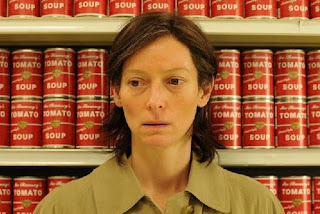 It's not that Swinton's Eva isn't a worthy performance - quite the opposite in fact - but Kevin is confronting, draining and in many ways controversial. Given that the film is an adaptation of Lionel Shriver's award winning 2003 novel by the same name, the film was always going to attract some attention; it was inevitably going to have a much bigger profile in the US than either of Swinton's previous two films. The material (as anyone who read the novel should know) is heavy, quite often troubling the reader with difficult and somewhat taboo ideas to reconcile in one's own mind, and Kevin's director, Lynne Ramsey, certainly doesn't shy away from delivering the novel's key themes. Despite adapting the source material in such a way as to remove the key devices which Shriver uses to tell her story (the novel being written in a first person epistolary format), the film never sacrifices the heart of the story and always stays true to its main character.
It's not that Swinton's Eva isn't a worthy performance - quite the opposite in fact - but Kevin is confronting, draining and in many ways controversial. Given that the film is an adaptation of Lionel Shriver's award winning 2003 novel by the same name, the film was always going to attract some attention; it was inevitably going to have a much bigger profile in the US than either of Swinton's previous two films. The material (as anyone who read the novel should know) is heavy, quite often troubling the reader with difficult and somewhat taboo ideas to reconcile in one's own mind, and Kevin's director, Lynne Ramsey, certainly doesn't shy away from delivering the novel's key themes. Despite adapting the source material in such a way as to remove the key devices which Shriver uses to tell her story (the novel being written in a first person epistolary format), the film never sacrifices the heart of the story and always stays true to its main character.Ramsey's visual mind is utilised effectively so as to translate these troubling and concerning literary elements of the novel into a visual feast; the film's opening scene, a sprawling, tomato-stained holy orgy is a foreboding entrance to Eva's story, setting the tone well for what is about to come. The film's scattered narrative may present difficulty for some, but for me it was the perfect way to understand our lead character's troubled mind; Ramsey's vision perfectly encapsulates the heavy weight on Eva's present as well as the contained trials of Eva's past, reconciling the two in tantalising agony. Throughout, violent flashes of the story's devastating climax are blasted to warn us of what is to come, and it is much a case of the audience not being able to take its eyes off the catharsis as it speedily approaches.
And yet Ramsey's greatest asset is her leading lady. Swinton is the perfect embodiment of the lead character, personifying every ordeal within to externalise a mother the audience can empathise with despite the very troubling sentiments we are left to digest. In those scenes from the past, there is a pain Eva tries to offload, and Swinton effectively shares that burden with the audience; yet in Eva’s present, an affliction even heavier remains centralised within, exposed only in a glazed emptiness behind Swinton’s eyes and the lethargy with which she staggers from place to place. Swinton’s masterful understanding of her craft allows the audience into Eva’s world, a place few would dare enter but one which Eva traps herself within. Swinton understands Eva’s plight like so few actresses could, every masochistic motion is undertaken with such subtle yet powerful emotion and her eyes are the most vivid of vessels which the audience can take this journey on.
This performance is one of the greatest I have seen in some time,
 certainly the best of Swinton’s career. Her empathic delivery of one of the most difficult character arcs I have seen in some time is a testament to her extremely well refined talent as well as effective directing from Ramsey. Putting together this piece in such a commanding yet controlled manner allows Swinton’s underlying appreciation of Eva’s plight to shine through. The pair’s powerful chemistry is the glue in this amazingly well-assembled adaptation, truly making the experience of Kevin precious, if difficult at times.
certainly the best of Swinton’s career. Her empathic delivery of one of the most difficult character arcs I have seen in some time is a testament to her extremely well refined talent as well as effective directing from Ramsey. Putting together this piece in such a commanding yet controlled manner allows Swinton’s underlying appreciation of Eva’s plight to shine through. The pair’s powerful chemistry is the glue in this amazingly well-assembled adaptation, truly making the experience of Kevin precious, if difficult at times.An adequate supporting cast, excruciatingly potent score and brilliant editing are some nice decoration on this superbly-made film; it is however unfortunate that Swinton (and the film) will likely be passed over by the Academy for a more audience-friendly performance which shows nowhere near the insight or understanding that we see here. Although disturbing at times, Kevin is truly an experience you will remember.